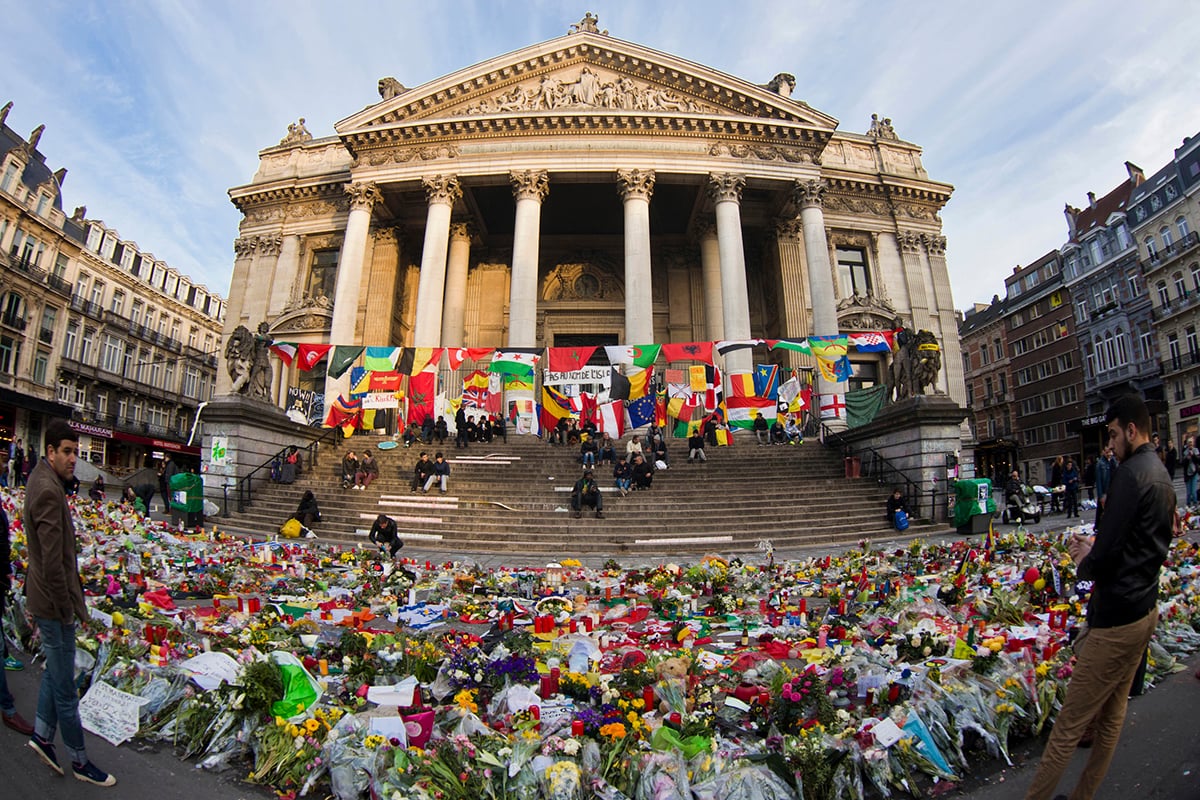Terror in Belgium
Europe has been jolted by terrorism once again—this time in Brussels, Belgium. What are the implications of this attack on the symbolic capital of Europe?
People gathered in front of the Stock Exchange to remember the victims of the terrorist attacks that took place on March 22, 2016, in Brussels.
The assaults occurred around 8 a.m. local time at Zaventem airport and the Maelbeek metro station. BBC reports that at least 30 have been killed and hundreds have been injured. This comes just days after Belgian police captured Salah Abdeslam, one of the suspects in the Paris attack.
As usual, terror threat levels were raised throughout the world in fear that more attacks could follow.
An attack on Europe
Today’s attack was not just an attack on a major metropolitan airport and subway station. Since Brussels houses many European Union institutions and the European Parliament, it served as a symbolic attack on the entirety of Europe.
French President Francois Hollande responded to the attack by saying, “Through the Brussels attacks, it is the whole of Europe that is hit.”
Experts warn that possibly hundreds of ISIS-related sleeper cells exist throughout Europe, mainly made up of young Muslim men. What makes these terrorists so hard to identify and capture is that they are a mixture of foreign-born immigrants from the Middle East (some entering Europe among millions of refugees) and radicalized Europeans of Middle Eastern origin.
Cas Mudde, associate professor of international affairs at the University of Georgia, quickly identified five takeaways from the Belgium attacks:
- Terrorism is the new normal in Western Europe.
- Even the strongest security measures cannot guarantee safety.
- The current terrorist model is to aim at soft targets. Though this makes for lower casualty rates than a 9/11–type attack, attacks on soft targets take less organization and are harder to detect.
- Most of these terrorists have a similar socio-demographic profile and make up only a small part of the European Muslim population.
- Terrorist cells in Europe are made up of individuals with both domestic and foreign roots. Many of these individuals are inspired by ISIS, but have no direct connection with ISIS (“The Brussels Attacks and the New Normal of Terrorism in Western Europe”).
In addition, the attacks raise the critical question of whether an “open Europe” is still feasible or whether European civil liberties will have to be compromised to increase security and surveillance in an effort to thwart future attacks.
Radical Islamic terrorism has Europe in its sights, and this threat will not disappear anytime soon.
Prophetic implications
Radical Islamic terrorism has Europe in its sights, and this threat will not disappear anytime soon. Combined with the challenges of the rapid influx of Middle Eastern and North African refugees flooding into Europe, the terrorist attacks are resulting in calls for more focus on security and immigration controls, as well as the rise of right-wing political parties.
Both of these trends have major prophetic implications. Bible prophecy predicts a powerful union of 10 nations or groups of nations, referred to as “the beast” and the “king of the North” arising in Europe. This great power will be led by a charismatic leader who will use fear, economics, intrigue and religion to unite much of Europe. His appeal could mirror Adolf Hitler’s rise to power in 1930s Germany—except instead of playing to the fears of one nation, this future leader will play to the fears of a continent, promising greater security, economic growth and a return to Europe’s former position as a dominant world power.
Daniel 11:40 shows this power will be in conflict with another power, called the “king of the South”—apparently a union of Muslim nations in the Middle East and North Africa.
Could the tensions between the Muslim world and the threat of terrorism lead to the rise of a charismatic personality who will promise Europeans security against Islamic terrorism? Could the current popularity of Pope Francis lead to a revival of Catholicism in the heart of Europe as an attempt to restore the historic cultural roots of Europe in the face of a continuing cultural clash with the Muslim world?
We will continue watching and reporting on these trends here at Life, Hope & Truth.
What is certain is that the threat of terrorism will soon be eliminated. Jesus Christ came to earth preaching the gospel of the Kingdom of God (Matthew 4:23). That gospel proclaims the central message that Jesus will return to this earth and set up a government that will bring peace to this world (Daniel 7:14, Daniel 7:27).
As we mourn the continued carnage and loss of life that comes with terror attacks like today’s attack in Brussels, we should be motivated to continue watching our world for the fulfillment of Bible prophecies and preparing ourselves for the return of Jesus Christ and the establishment of His Kingdom on earth.
Read our past articles and blog posts on terrorism and Bible prophecy:
- The New Face of Terrorism
- Terrorism in Paris, Coldness in Heart
- Terror in Paris
- The ISIS Threat: Where Is God?
Date Posted: March 22, 2016

 by Erik Jones
by Erik Jones

